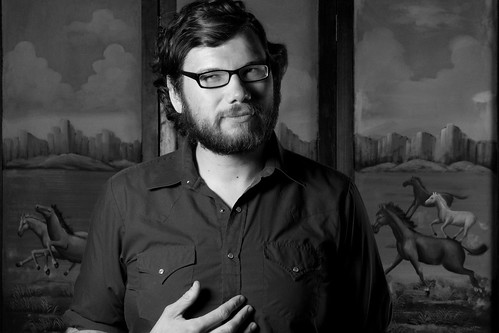
Oh! Pears
Corey Duncan, a Seattle, Wash. native, came to the East Coast to check out the music scene when he was 19. Though he thought he would only be here for a couple of months, after living in New Jersey for a year then moving to Philadelphia, he ended up calling Philly his new home.
Oh! Pears started as a solo project for Duncan a few years ago. Eventually, the project developed into a something much larger with, at times, 13 musicians on stage.
Duncan and the band toured the East Coast and Europe this past summer. With a unique orchestral sound, Oh! Pears has become a prominent fixture in the Philly music scene.
In addition to playing Oh! Pears shows, Duncan hosts and DJs a “hot jazz brunch” at Johnny Brenda’s every first Sunday of the month. Duncan talked with the Temple News about Oh! Pears growth and what is different about audiences here and abroad.
The Temple News: What led you to start Oh! Pears?
Corey Duncan: I was in the band Pattern Is Movement for a number of years. I was completely dedicated to that band, and worked very hard to make it everything it could be. It was a very collaborative process, which was really wonderful for the time that I was in the band, but it meant that I didn’t ever write a complete song. So the biggest question that I had swimming around in my head when I was thinking about my musical life was, “Do I actually know how to write an entire song?” That was the greatest factor in my very difficult decision to leave the band.
TTN: Having lived on both coasts, do you feel there are there major differences in the music scene?
CD: Yes, I absolutely think there are differences. The hardest thing for me living in Philly has been that people in general seem a little less curious about what happens in their own town. This may sound overly negative on my part, but I really don’t think that’s it. Someone would have to spend some time in the Northwest to really see what I mean. There are a ton of bands here that I absolutely adore, and the music community in Philly is incredibly supportive and so fun to be a part of.
To explain the differences between the music in these two cities, I will completely oversimplify. Seattle: Pop music with experimental tendencies. Philly: Experimental music with pop tendencies. There are tons of bands that contradict that summary, but overall, I think there’s some truth to it.
TTN: Shows in the past have had a full orchestra of musicians together. How did the band develop from a mostly solo project to this larger set-up?
CD: When I started this project I knew that to do what I wanted to do, I needed a large group of musicians to pull it off. In the middle of the recording process, I decided to try getting a group of musicians together to play a show and see how these songs shaped up live. I had strings playing a lot of the parts I had intended to be vocal harmonies, and as soon as I heard that, it just all snapped into place.
I couldn’t take 13 people out on tour because I couldn’t afford something like that. I ended up pairing it down to the elements I thought were the most essential to this project: strings and drums. We toured with guitar, cello, viola and drums.
TTN: Do you mostly construct the songs or is there collaboration with these musicians?
CD: I do write the vast majority of the music, and often play most of the instruments on the recordings. There have been some really amazing collaborations in these songs too. Sometimes I have an idea of how I want a part to move, but I don’t know how to make it happen, or just don’t have enough skill on an instrument to pull something off.
TTN: What are practices like with such a large group of people? Is it ever difficult musically to perform with many people?
CD: Lately I’ve been trying to do smaller ensembles more like the touring setup. That has been much more manageable for me. There was a period of time not too long ago when the 13 to 16 piece ensemble was playing in Philly quite a bit. It was really fun, but it also was quite a challenge in terms of getting everyone to stay focused and get things done. There was definitely a serious rush that came with playing in a group that big though. I think we really did sound great a lot of the times, and I totally love everyone that’s been involved.
TTN: Were there any differences you noticed between audiences here in the Northeast and audiences abroad?
CD: I think people in Europe were less inhibited. I’ve noticed on tour in America during the years that a lot of people in the audience will look around to see if other people are getting into a band before they can feel comfortable even nodding their heads to a band or whatever. In Europe, I saw more people looking around, already smiling and nodding their heads to vibe with everyone else at the show.
Maura Filoromo can be reached at
maura.filoromo@temple.edu.



Be the first to comment